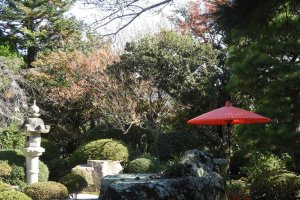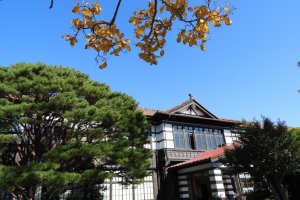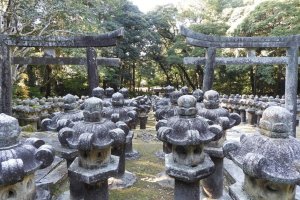Go on a journey through the streets of Hagi, Yamaguchi, where clear ocean waters, lush mountains, history, and charm will welcome you with open arms.
Rent a bike for a few hundred yen from Yokoyama Shoten; on the corner opposite the Central Park and next to the rickshaws. Riding is the best way to cover the Hagi area. You’ll have a blast stopping for photos and popping into the little shops along the way.

Hagi Meiringakusha Visitor Center
Our first stop is the Hagi Meiringakusha Visitor Center, a former-school turned history museum.
This is the perfect place to get an overview of the city, an introduction to the history of other sites in Hagi. Don’t miss out on the 16-minute movie (available upstairs) that sets the scene and teaches you about the origins of Japan’s Industrial Revolution and how Hagi prospered under the rule of the Mori clan. You will be pleasantly surprised to see plenty of English descriptions throughout the museum, even the aforementioned video is in English. Enjoy walking around at your leisure and look for the friendly volunteer staff if you need any assistance.

Don’t forget to experience:
- It costs ¥300 to enter the second building.
- VR Experience: For ¥100 you can experience life back in former times. Japanese language only.
- The amazing display collection of guns, cannons, swords, and more is jaw-dropping, especially when you hear it was all donated by one man.
With all that history clear in your mind, it’s time to explore more!
Toko-ji
Photographers won’t be able to get enough of this place. Don’t be fooled by this Obaku Zen-sect temple and think that it’s just another temple. Walk to the back of all the temple buildings and you’ll definitely gasp in awe. More than 500 tall, stone lanterns surround the graves of the Mori clan lords, their wives, and children providing a solemn treat for the senses. Take the Hagi City Circular Hop-On Bus or ride your bike to reach this spot.

Lunchtime
Look no further than Hotori Tei. A beautiful traditional Japanese-style home that looks onto a landscaped Japanese garden. Be delighted by the scrumptious drinks and food at this beautiful location.

Castle streets
Stop at the 400-year-old Kikuya Residence and enter a beautiful traditional Japanese garden. This garden can only be entered during a special event period in summer and autumn. Walk slowly to enjoy every nook and cranny. Continue on to explore the many rooms of the residence building and let your eyes feast on old pottery, Edo period maps, and ornate sword guards.

Tips:
- Ask the on-site guide what the large wooden cage in one of the rooms is for.
- Book a kimono dressing at Kimono Style Cafe and ride a rickshaw or stroll through the streets.
- Look for the Kai Magari streets. The sharp right-angle corners create an illusion that the road ends. This was so the enemy would be tricked into thinking it was a dead-end and turn back.
Before the sun sets and you return your bike, pedal over to the beach about five minutes away. Kikugahama is a fantastic beach where you can sit on the boardwalk and absorb the beautiful view. On a clear day, you can see all the islands in the distance with a breathtaking sunset blanketing the sky.

Akiragi
If you still have time, visit this orange-tile-roofed town. Halfway between the airport and Hagi, it’s easiest accessed by car or scooter, although a bus also runs from Shin-Yamaguchi Station. It is very unusual to see roof tiles in this color as they are normally black. The material used for these vibrant tiles is much stronger to protect the roof from heavy snow.
Spend a few hours strolling around the town. Akiragi is part of the 53 km Hagi-Okan Highway completed in the Edo period (1603-1868). It was also listed in 1996 as one of the 100 historical highways in Japan; In 2004, 500 roads to walk in Japan (Hagi-Yamaguchi); and in 2007, it was named as one of the Scenic Byways of Japan. You’ll definitely see why when you visit.

Your time in Hagi will eventually come to an end but it will doubtlessly remain in your heart as one of your favorite places in Japan. Hagi really does have it all.


























